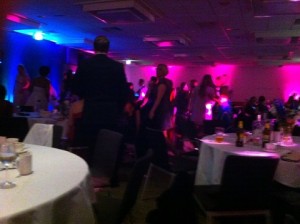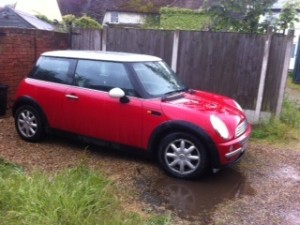 This is the one photo I took at the awards. It’s the dance floor during the party and, although I may be the UK’s worst photographer, I think it does capture the atmosphere and energy of the evening. I love to get on a dance floor and forget about everything else, especially when the music is old enough for me to recognise it!
This is the one photo I took at the awards. It’s the dance floor during the party and, although I may be the UK’s worst photographer, I think it does capture the atmosphere and energy of the evening. I love to get on a dance floor and forget about everything else, especially when the music is old enough for me to recognise it!
The next morning, I woke up feeling a bit tired and groggy, even though the most toxic substance that had passed my lips was cinnamon ice cream (yum!). I always enjoy a cooked breakfast when I am away and took full advantage of the hotel’s facilities to fuel myself before the long drive home.
Before packing, I just checked in with the friend who was staying at my mother’s, and immediately realised something was wrong. Especially when she said, ‘now, nothing to worry about…’ Mother had had a very difficult night, struggling to breathe, and the out of hours GP was on her way. I was not to rush but could I please be on my way as soon as possible?
It was interesting, trying to be quick and efficient but also wanting to make sure I hadn’t left anything behind. I also needed to concentrate really hard to negotiate my route out of the centre of Birmingham which, thankfully, went smoothly. I stopped at some motorway services to check what was happening and my friend told me the GP still hadn’t turned up so she had phoned an ambulance. Good. I was pleased that someone was making the same sort of decisions that I would have made, but it was painful to be so far away.
I kept driving. I dug out an old strategy and turned the radio to Radio 4 rather than a music station. When my thoughts are feeling uncontrollable, it always helps to have something external to focus on, and speech is always more of a distraction for me than music. After a while, I stopped again to see what had happened. Apparently, the First Responder, a paramedic in a car, the GP and two ambulance men all arrived at almost exactly the same time. They ran ECGs and, as always, turned the concern up a notch once they could see the serious heart attack that Mother had had 13 years ago, and when they heard her irregular heartbeat. Once they had run the essential tests, they would be off to Colchester General. I rang my brother, who is usually the one further away, and asked him to go to the hospital as he would get there before me. Then back to the motorway.
 This is my little, much loved car which was home to me and my thoughts during those four long hours. I found myself fixing on practicalities, clinging on to logic and rationalisation as if, somehow, thinking would help me to control an uncontrollable situation. Because I think, talk and write so much about over-thinking and worry, I watched what I was doing and tried to learn from it. I kept listening to the radio, used the ‘Ho’oponopono mantra (see the book, Zero Limits, which I have talked about before), and recited simple prayers to remind myself to let go…let go…let go. I knew I could do nothing to influence what was happening in Essex, but I also knew that my mind really believed that I could take control if only I thought hard enough.
This is my little, much loved car which was home to me and my thoughts during those four long hours. I found myself fixing on practicalities, clinging on to logic and rationalisation as if, somehow, thinking would help me to control an uncontrollable situation. Because I think, talk and write so much about over-thinking and worry, I watched what I was doing and tried to learn from it. I kept listening to the radio, used the ‘Ho’oponopono mantra (see the book, Zero Limits, which I have talked about before), and recited simple prayers to remind myself to let go…let go…let go. I knew I could do nothing to influence what was happening in Essex, but I also knew that my mind really believed that I could take control if only I thought hard enough.
Over and over, I practised dropping from the story, the thoughts in my head, to the feelings in my body. The more I did that, the less I felt taken hostage by my thoughts. I remembered advice given recently to a bereaved friend to ‘focus on the love, then the thoughts will diminish,’ or very similar words. So, instead focussing on negative thoughts and fears about my mother’s situation, I focussed on the love I feel for her. That really, really helped.
I must explain that we have a long history with my mother being rushed into hospital, since her heart attack in 2000 when I just happened to be on holiday in Scotland. Since then, she has come to live near me and I have called ambulances for her on countless occasions, usually when she has had chest pain. On one memorable day, they sent the wonderful Air Ambulance and I had to go outside the house to wave to it. It was an extraordinary feeling seeing it circle in response to my signal! So you might think that, with all that experience, I would be immune to fear when this happens. I am not sure that follows, especially when I am far away and unable to see exactly what is happening and speak to the paramedics and doctors. It also seems to trigger memories of all the previous frightening experiences.
As a family, you wouldn’t know that we are afraid. When I finally arrived at the hospital, having, I think, triggered only one speed camera, my brother and sister-in-law were there with my friend and everyone seemed relaxed. I checked with my mother that she had brought the large box that contains her medication, and we all joked and swapped news. We are great in a crisis and we always remember the practical stuff. But I guess that, inside, everyone was a little bit frightened.
I felt much more comfortable once I was being useful. Instead of driving, driving, driving, I could speak to doctors and nurses, help to keep my mother comfortable and make sensible plans. And I could see what was going on. A week later, she is home again and I am feeling involved, making my contribution to her wellbeing and helping to manage her care. It feels ok.
That journey was uncomfortable but it was a great reminder and gave me a wonderful opportunity to practise some of my worry-resilience strategies. They do work; when things are really serious perhaps the worry doesn’t go away completely, but it subsides so I can be present, do what is in front of me to be done, and minimise the damage done by stress and fear. There are three points which, looking back, were made really clear by this experience:
1.Crazy as it might seem, we really do believe that, if we worry enough about something we have no control over, we might be able to do something about it;
2.Despite this belief, we really can’t do anything about most problems outside ourselves, especially if we are somewhere else entirely, however much we worry;
3.Even though we might think we have to worry, we actually can control our fearful and negative thoughts, reduce the stress they cause and stay present and relatively comfortable.
Harriet, i feel tremendous empathy for you in this situation but ver pleased you managed to use your anti- worry practical strategies during the journey. It’s interesting, that once you get to the ‘doing’ part, i.e. being at the hospital, the worry loses its momentum. It’s that whole thing of being powerless and not being busy that fuels the worry.
My father died suddenly on an August Saturday. I will never forget the drive up to Yorkshire, stuck first on the A14 and then the A1 in dreadful holiday traffic.
I had the Barchester Chronicles Radio 4 recordings on CD and purposeley put them on. They settled me and I believe kept me safe.
I have recently experienced an ongoing situation in reverse. I am an only chid and mum is 200 miles away. She is 83 and doesn’t drive. She has found it really difficult coping with my cancer treatment and not being here to be directly involved so we have maintained daily phone calls and she came down the times I had surgery.
The insight t gave me was it is much harder to be the by-stander tan the one getting the ride in the air ambulance!
Jx
Hi Juliana, thank you for your comment and your insight. Waiting or standing by can indeed be so stressful. I see that in my job a lot, too. People dread the visit to the police station or the court appearance but they actually feel better once it happens because they are doing something rather than just waiting. As a mother I also empathise with your mum – the last thing we want is for our child to be seriously ill. I hope she is feeling happier now that you are doing so well x